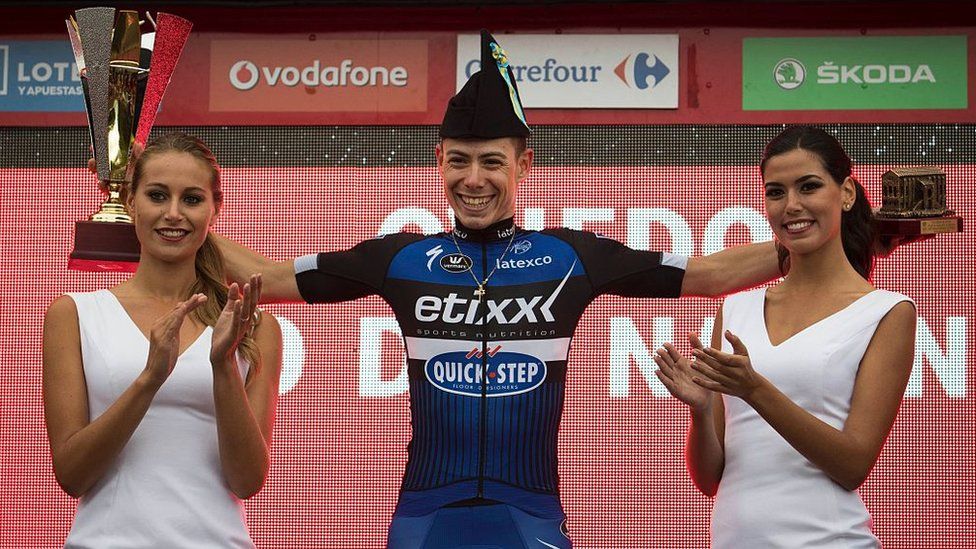Spain's La Vuelta cycle race changes 'sexist' hostess role
- Published

The organisers of Spanish cycling race La Vuelta say they will change the role of women on the winners' podium, after calls of sexism.
The current tradition sees each stage's winner take the stage, surrounded by attractive women.
Unipublic, which organises the annual event, says recent debate in the press and on social media has led it to reconsider its protocol.
The ceremonies will now include male assistants.
The female hostesses - in Spain and in other races across the world - often pose by kissing the winner, and then get sprayed with Champagne.
"We are not eliminating the hostesses altogether. We are not getting rid of those jobs," a Unipublic representative, Laura Cueto Morillo, told the BBC, adding that they would be joined instead by men in similar roles.
"What we don't want is the usual photo of a winner getting a kiss on each cheek."
Spanish sports journalist Lola Hernánde shared the news with a female colleague on Twitter, writing: "Moving forward, little by little."
The headline on Spanish newspaper El Mundo on Tuesday read: "A Vuelta without hostesses' kisses and with male assistants on the podium."
Unipublic points out that it is not prohibiting kisses. "Kisses are a typical greeting here. If the hostesses or the local mayor or whoever else [involved in the ceremony] wants to give kisses, that's fine," said Ms Morillo.
In January, Australia's cycling race Tour Down Under replaced its podium girls with junior riders.
The Australian government had already withdrawn funding for so-called "grid girls", who perform a similar role in motor racing, at an event in Adelaide last year.
South Australia Sports Minister Leon Bignell said at the time that the tradition could foster body image issues.
"The government's paying for grid girls at the same time we're putting money into mental health areas to help young women who have body image problems," he told Australia's ABC news network.
"What we actually want to do is inspire girls and young women who come to the motor racing to be car drivers or to be mechanics or to be engineers," he added.
Spanish cyclist Mikel Landa praised the Australian decision: "Podium girls presenting the prizes is an old tradition, it's like treating the women as objects, and undervaluing them."
However, some hostesses have also defended their roles.
"Personally, I have never perceived my work as sexist. I am wrapped up and no-one forces me to do it," Lien Crapoen, a hostess at Belgium's Flanders Classics, told Sporza (in Dutch).
The moves have prompted questions about whether a change will be seen at other big races where the same hostess tradition continues, such as during France's Tour de France.
Past podium controversies:
- In 2003, hostess Melanie Simonneau was sacked for accepting a note from stage winner George Hincapie. The couple went on to marry
- In 2013, Slovakian cyclist Peter Sagan had to apologise after pinching the bottom of a hostess at the end of the Tour de Flanders
- In June 2017, Belgian rider Jan Bakelants also apologised after telling a newspaper he travels with a "pack of condoms, because you never know where those podium chicks have been hanging out"
- Published3 July 2013
- Published29 June 2017